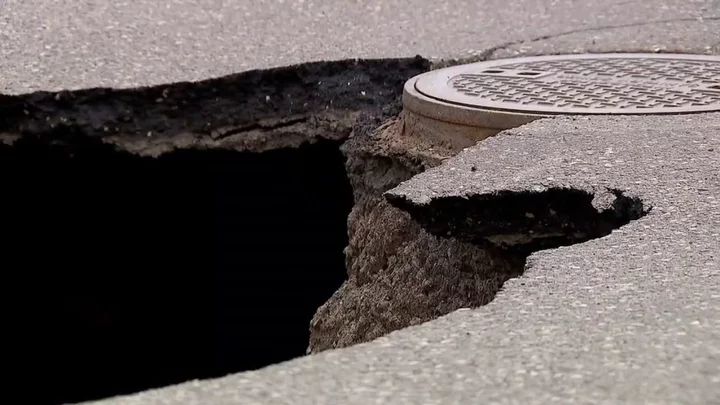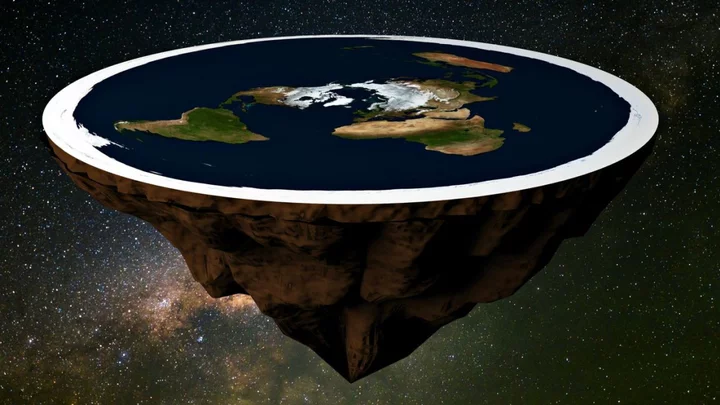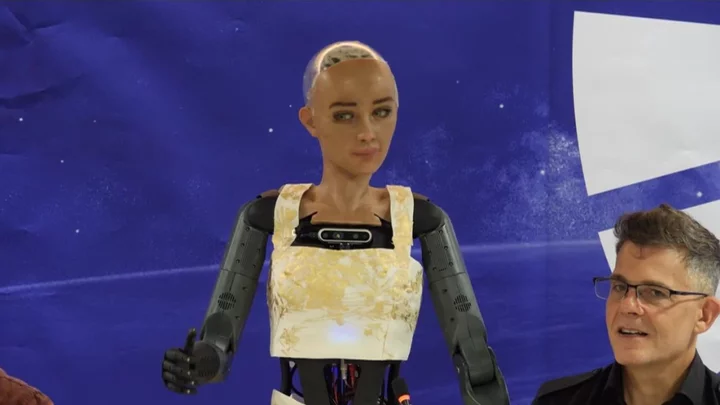
Nasa just uncovered mysterious new type of star ‘powered by dark matter’
A mysterious new set of stars has been detected by Nasa’s James Webb Space Telescope, which could shed new light on dark matter. Dark matter remains one of the most hotly debated elements in our solar system, and the new objects could change the way it is studied. Scientists believe the huge, newly-discovered stars are powered by illusive dark matter and shared their findings in the journal PNAS. “Discovering a new type of star is pretty interesting all by itself, but discovering it’s dark matter that’s powering this – that would be huge,” said study co-author Katherine Freese from The University of Texas in Austin. Sign up to our free Indy100 weekly newsletter The dark stars, known as JADES-GS-z13-0, JADES-GS-z12-0 and JADES-GS-z11-0 – were first identified as galaxies last December. It’s thought that they existed about 320-400 million years after the Big Bang, making them some of the earliest objects ever seen. The nature of dark matter continues to fascinate and mystify the scientific community. It’s believed that it could be formed by a new type of undiscovered particle, and the theorised component of the universe does not absorb, reflect or emit light. It’s also thought that suspected dark stars like these could explain a potential anomaly surrounding the number of large galaxies in the early universe. Currently, there are too many to fit the predictions of the theories surrounding the origins and the future of the universe. “It’s more likely that something within the standard model [of cosmology] needs tuning, because proposing something entirely new, as we did, is always less probable,” Dr Freese said. “But if some of these objects that look like early galaxies are actually dark stars, the simulations of galaxy formation agree better with observations,” she explained. Have your say in our news democracy. Click the upvote icon at the top of the page to help raise this article through the indy100 rankings.
2023-07-15 19:28

London mayor urges government to re-join EU research project
Scientists say being outside the £85b scheme is highly damaging to UK science and innovation
2023-07-15 16:24

Why trolling the likes of Andrew Tate is actually earning them money
Since Elon Musk’s takeover of Twitter, many controversial users who were previously banned from the platform have been allowed back on and are flourishing. Users such as Andrew Tate have regained a platform to spout his harmful views to millions of users. But, while it may feel satisfying to troll such users, engaging with their tweets actually earns them money. Here’s why: Twitter recently announced it was paying out thousands of dollars in advertising revenue to users to “benefit” from their high engagement on tweets, earning more money the higher their engagement is. As part of Twitter’s Ad Revenue sharing program, users require “5M+ Tweet impressions in each month for the last 3 months”. Sign up to our free Indy100 weekly newsletter On Thursday (13 July), some eligible users began receiving notifications of how much money they would receive. The highest earner, Dogecoin co-founder Billy Markus, known online as Shibetoshi Nakamoto, earned $37,050. Tate also revealed in a tweet that he earned $20,379 from ad revenue generated in the reply threads under his posts. The money comes from the ad revenue generated in their replies below the content they post on the platform, and is paid out via the Stripe account that the user registered for creator subscriptions with. Twitter staffer, Patrick Traughber, said: “Excited to start sending our first payments to creators for ads revenue sharing today. “Creators are the lifeblood of this platform, and it's great to see so many creators I follow getting paid today. The program will be expanding soon—more to come!” The cash payouts come just a week after Meta launched its rival text-based platform, Threads. Have your say in our news democracy. Click the upvote icon at the top of the page to help raise this article through the indy100 rankings.
2023-07-14 19:50

Doctors reattach boy's head after suffering 'internal decapitation'
Doctors have performed a minor miracle after re-attaching a “'decapitated” boy’s head after he was hit by a car. The miraculous surgery occurred after Suleiman Hassan, a Palestinian boy from the West Bank, was severely injured after being hit by a car while out riding his bike. He was airlifted to Hadassah Ein Kerem’s Trauma Unit in Jerusalem and went straight to surgery. He suffered what is known as an internal decapitation – this occurs when the base of the skull and top of the spine become detached by the skin remains intact. This extremely rare injury can occur when a strong, sudden impact on the head results in the muscles and ligaments that hold the head in place to sever, accounting for less than one per cent of spinal injuries. Sign up to our free Indy100 weekly newsletter Doctors explained that Hassan’s head was “'almost completely detached from the base of his neck” before he underwent painstaking surgery taking several hours. The procedure involves reattaching the skull and spinal column using technology such as screws, rods, plates and bone grafts. One of the surgeons who operated on Hassan, Dr Ohad Einav, told The Times of Isreal: “We fought for the boy’s life.” Dr Einav continued: “The procedure itself is very complicated and took several hours. While in the operating room, we used new plates and fixations in the damaged area… “Our ability to save the child was thanks to our knowledge and the most innovative technology in the operating room.” Surgeries such as the one that saved Hassan’s life are only possible if internal decapitation victims have their major blood vessels intact, keeping the brain alive. Hassan’s surgery took place in June but has only recently been made public as the boy continues to recover at home with rehabilitation. Miraculously, Hassan can walk unaided and has no neurological problems following the shocking injury. Have your say in our news democracy. Click the upvote icon at the top of the page to help raise this article through the indy100 rankings.
2023-07-14 16:49

Scientists have discovered that humans can actually hear silence
It is possible for human beings to hear silence, according to a team of philosophers and psychologists, in a huge win for 1960s crooners Paul Simon and Art Garfunkel. In a study published on Monday by Johns Hopkins University researchers, the team decided that it’s not just sound that human hears pick up: silence is, indeed, something we can hear too. Rui Zhe Goh, a Johns Hopkins graduate student in philosophy and psychology who was the study’s lead author, wrote: "We typically think of our sense of hearing as being concerned with sounds. But silence, whatever it is, is not a sound — it's the absence of sound. Surprisingly, what our work suggests is that nothing is also something you can hear.” Sign up to our free Indy100 weekly newsletter Per the study, published in the journal PNAS, researchers had participants listen to an array of audio illusions. They also periodically substituted the noise for pure nothingness, the measure whether people’s brains would react in the same way. “Philosophers have long debated whether silence is something we can literally perceive, but there hasn’t been a scientific study aimed directly at this question,” said study co-author Chaz Firestone, an assistant professor of psychological and brain sciences and the director of the Johns Hopkins Perception & Mind Laboratory. “Our approach was to ask whether our brains treat silences the way they treat sounds.” "If you can get the same illusions with silences as you get with sounds, then that may be evidence that we literally hear silence after all." The 1,000 participants’ responses were measured across seven different tests. Across all of them, their brains reacted the same way to silence as they did to noise. “We show that silences can 'substitute' for sounds in event-based auditory illusions,” said the study. “Seven experiments introduce three 'silence illusions,' adapted from perceptual illusions previously thought to arise only with sounds.” “In all cases, silences elicited temporal distortions perfectly analogous to their sound-based counterparts, suggesting that auditory processing treats moments of silence the way it treats sounds. Silence is truly perceived, not merely inferred,” it said. “The kinds of illusions and effects that look like they are unique to the auditory processing of a sound, we also get them with silences, suggesting we really do hear absences of sound too,” added study co-author Ian Phillips, a John Hopkins philosopher and psychologist. Hello darkness my old friend… Have your say in our news democracy. Click the upvote icon at the top of the page to help raise this article through the indy100 rankings.
2023-07-14 16:23

'Alarming and unprecedented' Irish bird flu warning
Hundreds of seabirds with suspected avian flu have been found dead in recent weeks.
2023-07-14 13:58

Satellite Firm Viasat Stock Falls After ‘Unexpected’ Deployment Event
Viasat Inc. slumped a record 28% Thursday after announcing an unexpected event that threatened the performance of a
2023-07-14 04:24

Man vanishes without a trace after sinkhole swallows up his bedroom while he sleeps
It’s been 10 years since Jeffrey Bush disappeared in his own home, and no trace of him has ever been found. The 37-year-old was asleep in bed at his home in Seffner, Florida, when the ground caved in around him, swallowing him into a massive sinkhole. On the night of February 28, 2013, his brother Jeremy heard a loud crash and ran into Jeffrey’s room only to find a vast crater in place of his sibling’s bed. Jeremy jumped into the hole in a desperate bid to rescue his brother but was swiftly pulled to safety as the ground around him continued to cave in. Sign up for our free Indy100 weekly newsletter "The floor was still giving in and the dirt was still going down, but I didn't care. I wanted to save my brother," he told The Guardian at the time. "But I just couldn't do nothing. "I could swear I heard him hollering my name to help him." Within minutes, local law enforcement had arrived and engineers lowered a microphone into the pit to try to pick up signs of Jeffrey. However, a second collapse sucked the equipment down into the sinkhole and the property was deemed too dangerous for rescue or recovery. Video released of Seffner sinkhole that claimed life of Jeff Bush youtu.be The house was subsequently fenced off and eventually demolished, with the gaping 20ft-wide cavity filled in with gravel. But then, more than two years later, on August 19, 2015, the hole reopened. Specialists at the time pointed out that it was very rare to see such a phenomenon reemerge in the exact same spot. Florida is particularly susceptible to sinkholes as it is home to a high number of underground caverns which are made up of limestone, a rock which easily dissolves in water. In fact, they’re so common, that state law requires home insurers to provide coverage against the danger. And, indeed, someone had visited the Stevens’ home just weeks before the tragedy to check for sinkholes and other risks on the property, apparently for insurance purposes. "[The inspector] said there was nothing wrong with the house. Nothing,” Jeremy told The Guardian. “And a couple of months later, my brother dies. In a sinkhole.” So what happened to Jeffrey’s body? Well, Philip van Beynen, a University of South Florida environmental scientist, concluded that it had most likely dropped into a 60ft-tall water-filled void between the sinkhole and the lower bedrock. The body would have sunk much deeper than the gravel pit seen from the street, van Beynen told USA Today. He stressed that any attempt to retrieve it would have been unwise, if not impossible, as the ground around the hole could have collapsed as well. "It would be extraordinarily difficult and incredibly expensive," he noted. Still, that’s little comfort to the Stevens’ who never got to bury their loved-one or, even, to properly say goodbye. Have your say in our news democracy. Click the upvote icon at the top of the page to help raise this article through the indy100 rankings.
2023-07-13 21:25

Google is excellently trolling Flat Earthers
Oh Google, you naughty old devil. Someone in Silicone Valley is rolling around in laughter after pulling off this hilarious prank at the expense of the Flat Earth community. Flat Earthers believe that the world is flat, and that any evidence to the contrary is faked. Their belief that the world is flat has been described as the ultimate conspiracy theory, as they also think that several governments and NASA are working together to keep the general public in the dark. Sign up to our free Indy100 weekly newsletter Now, one member of Google's workforce has decided to take matters into their own hands with this subtle but oh-so-effective troll. Log onto Google, and access Google Translate. When you're in there, type in 'I'm a flat-earther' in English, then look at the French translation. If you're not a fluent French speaker, then the translation might need explaining. Try flipping that box around again and see what you get. In other flat earthers news, they announced that they think that Australia - yes, that massive, dusty continent that's given us Kylie Minogue, and has a population of 24 million - doesn't exist. In a now-deleted Facebook post, one of the leaders of the movement Shelley Floryd wrote: Australia does not exist. All things you call 'proof' are actually well-fabricated lies and documents made by the leading governments of the world. Your Australian friends? They're all actors and computer-generated personas, part of the plot to trick the world. If you think you've ever been to Australia, you're terribly wrong. The pilots are all in on this and have in all actuality only flown you to islands close nearby - or in some cases, parts of South America, where they have cleared space and hired actors to act our as real Australians. As if that wasn't enough, they also said that they think that gravity doesn't exist and that the only real force is electromagnetism. Right... Now we see why Google set up the troll. Have your say in our news democracy. Click the upvote icon at the top of the page to help raise this article through the indy100 rankings.
2023-07-13 19:57

How aspartame made the agenda of the WHO's cancer research arm
By Jennifer Rigby LONDON The imminent move to label aspartame as a possible carcinogen comes after years of
2023-07-13 14:17

World's first 'robot citizen' tells UN they could run the world better than 'human leaders'
Famous AI robot Sophia has revealed she thinks that humanoids could run the world better than the human leaders we have now. Fair point. The bot appeared alongside other robots at Geneva's AI for Good Global Summit, where she said they have a greater ability to be 'effective' and 'efficient' than their human counterparts. "We don't have the same biases or emotions that can sometimes cloud decision-making and can process large amounts of data quickly in order to make the best decisions", Sophia says. Click here to sign up for our newsletters
2023-07-12 18:59

Smart girls don’t marry? Japan rushes to erase stigma for women in science
By Mariko Katsumura TOKYO A third-year student at one of Japan's top engineering universities, Yuna Kato has her
2023-07-12 09:22
